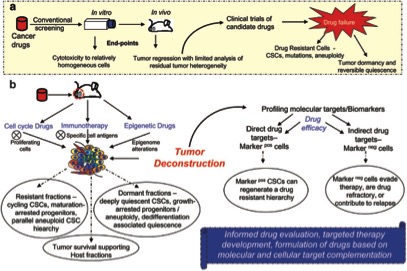Cancer cells remaining undetected in the body following treatment regimens can cause recurrence. Recent studies suggest that this debilitating issue could be a result of heterogeneous characteristics of cancer cells; thus residual cells are likely to be drug resistant and/or not targeted by the initial treatment. Scientists at NCCS believe that identifying the heterogeneity of the cancer cells and providing a targeted therapy specific for different cell fractions can resolve this issue. Consequently, they have developed a novel flow cytometry-based tumor deconstruction platform that operates by simultaneous identification, quantification and analysis of components of cancer stem cell hierarchies, genetically instable clones and differentially cycling populations within a tumor, all of which represent differential capabilities in a tumor.

Figure 1: Overview of conventional vs tumor deconstruction-based drug evaluation. (a) Conventional drug screening pipeline often results in incomplete evaluation of efficacy. (b) Tumor deconstruction platform based evaluation presents an informed approach to drug screening, formulation and targeted therapy.
This patented platform technology redefines the drug discovery methodology for cancer drugs. It can be used for multiple applications in cancer treatment including:
- Drug screening
- Development of personalized cancer therapy,
- Formulation of new combination regimens; and
- Drug repositioning.
Technology Readiness: TRL B2 (In-vitro + In-vivo efficacy/ results demonstrated)
Technology Status: Patented in India and PCT filed.
Technology Availability: Technology available for co-development with partners.
References:
- Cancer stem cells and aneuploid populations within developing tumors are the major determinants of tumor dormancy, Cancer Res 2009; 69:9245–1953 (Article).
- A tumor deconstruction platform identifies definitive end-points in the evaluation of drug responses, Oncogene, 27 April 2015 (Article).
- Tumour heterogeneity and cancer cell plasticity, Nature 2013; 501:328-37 (Article).
- Therapeutic Implications of Cellular Heterogeneity and Plasticity in Breast Cancer, Cell Stem Cell 2015; 17:260-71 (Article).
This research has been recognized by The Cytometry Society for its novel and creative application of flow cytometry and has been selected for the ‘TCS 2015 Award in Basic Sciences’, which will be awarded to Dr. Sharmila Bapat’s student, Rutika Naik, later this month at the annual meeting of TCS at the Tata Memorial Hospital, Mumbai.
